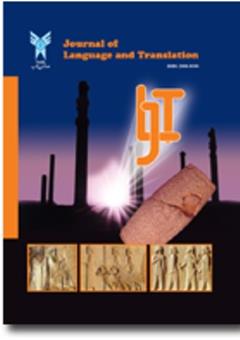Emotional Feelings of Iranian Novice and Experienced EFL Teachers Toward Colleagues, Educational Staff, Professional Networks and Student's Progress
محورهای موضوعی : نشریه زبان و ترجمه
Masoud Hashemi
1
,
Peyman Rajabi
2
![]() ,
Abbas Bayat
3
,
Abbas Bayat
3
![]()
1 - Department of English language, Malayer Branch, Islamic Azad University, Malayer, Iran
2 - Department of English language, Malayer Branch, Islamic Azad University, Malayer, Iran
3 - Department of English Language, Malayer Branch, Islamic Azad University, Malayer, Iran
کلید واژه: emotional feelings, Iranian EFL teachers, novice teachers, experienced teachers,
چکیده مقاله :
The purpose of this article was to study the emotional feelings of Iranian novice and experienced EFL teachers. A group of 63 experienced and novice language teachers (33 men and 19 women) were selected by a purposeful sampling from the statistical population (77 people). The Persian version of the TES questionnaire was used to measure the emotional feelings of the participants toward their professional lives. About 80% of the novice teachers reported having the first stage of emotional feeling: fantasy. They described various fantasies about their students, the parents, and the school staff and the pleasant or unpleasant environments they think they will have in their future classrooms. This stage (unrealistic positivism) seemed quite pleasing to them since students and their parents respected them for their hard work, and no one wanted to misbehave. Moreover, 79% of novice teachers reported experiencing the "survival" stage, in which they fought for their professional identity and a sense of worth among students and colleagues, and 92 % reported a sense of failure when their students failed their classes.
The purpose of this article was to study the emotional feelings of Iranian novice and experienced EFL teachers. A group of 63 experienced and novice language teachers (33 men and 19 women) were selected by a purposeful sampling from the statistical population (77 people). The Persian version of the TES questionnaire was used to measure the emotional feelings of the participants toward their professional lives. About 80% of the novice teachers reported having the first stage of emotional feeling: fantasy. They described various fantasies about their students, the parents, and the school staff and the pleasant or unpleasant environments they think they will have in their future classrooms. This stage (unrealistic positivism) seemed quite pleasing to them since students and their parents respected them for their hard work, and no one wanted to misbehave. Moreover, 79% of novice teachers reported experiencing the "survival" stage, in which they fought for their professional identity and a sense of worth among students and colleagues, and 92 % reported a sense of failure when their students failed their classes.
Becker, E. S., Keller, M. M., Goetz, T., Frenzel, A. C., & Taxer, J. L. (2015). Antecedents of teachers’ emotions in the classroom: an intraindividual approach. Frontiers in psychology, 6, 635.
Darby, A. (2008). Teachers’ emotions in the reconstruction of professional self-understanding. Teaching and teacher education, 24(5), 1160-1172.
Frenzel, A. C. (2014). Teacher emotions. In E. A. Linnenbrink-Garcia & R. Pekrun (Eds.), International Handbook of Emotions in Education (pp. 494-519). New York:Routledge.
Frenzel, A. C., & Götz, T. (2007). Emotion-ales erleben von lehrkräften beim un-terrichten. Zeitschrift für pädagogische Psychologie, 21(3/4), 283-295.
Frenzel, A. C., Becker-Kurz, B., Pekrun, R., & Goetz, T. (2015). Teaching this class drives me nuts! Examining the person and context specificity of teacher emotions. PloS one, 10(6), e0129630.
Frenzel, A. C., Thrash, T. M., Pekrun, R., & Goetz, T. (2007). Achievement emotions in Germany and China: A cross-cultural validation of the Academic Emotions Questionnaire—Mathematics. Journal of cross-cultural psychology, 38(3), 302-309.
Goetz, T., Frenzel, A. C., Pekrun, R., & Hall, N. C. (2006). The domain specificity of academic emotional experiences. The Journal of Experimental Education, 75(1), 5-29.
Hargreaves, A. (1998). The emotional practice of teaching. Teaching and teacher education, 14(8), 835-854.
Hargreaves, A. (2000). Mixed emotions: Teachers’ perceptions of their interac-tions with students. Teaching and teacher education, 16(8), 811-826.
Keller, M. M., Frenzel, A. C., Goetz, T., Pekrun, R., & Hensley, L. (2014). Ex-ploring teacher emotions: A literature review and an experience sampling study. Teacher motivation, 69-82.
Pekrun, R., Goetz, T., Frenzel, A. C., Barchfeld, P., & Perry, R. P. (2011). Measuring emotions in students’ learning and performance: The Achievement Emotions Questionnaire (AEQ). Contemporary educational psychology, 36(1), 36-48.
Pekrun, R., Goetz, T., Perry, R. P., Kramer, K., Hochstadt, M., & Molfenter, S. (2004). Beyond test anxiety: Development and validation of the Test Emotions Questionnaire (TEQ). Anxiety, Stress & Coping, 17(3), 287-316.
Schutz, P. A., & Zembylas, M. (2009). Introduction to advances in teacher emotion research: The impact on teachers’ lives (pp. 3-11). Springer US.
Sutton, R. E. (2004). Emotional regulation goals and strategies of teachers. Social psychology of education, 7(4), 379-398.
Sutton, R. E. (2007). Teachers' anger, frustration, and self-regulation. In Emotion in education (pp. 259-274). Academic Press.
Sutton, R. E., & Harper, E. (2009). Teachers' emotion regulation. In International handbook of research on teachers and teaching (pp. 389-401). Boston, MA: Springer US.


